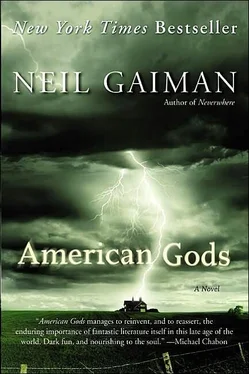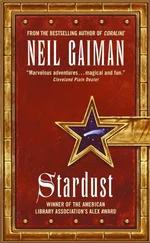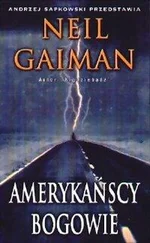Neil Gaiman
American Gods
For absent friends-Kathy Acker and Roger Zelazny, and all points between.
One question that has always intrigued me is what happens to demonic beings when immigrants move from their homelands. Irish-Americans remember the fairies, Norwegian-Americans the nisser, Greek-Americans the vrykolakas, but only in relation to the events remembered in the old country. When once I asked why such demons are not seen in America, my informants giggled confusedly and said “They’re scared to pass the ocean, it’s too far,” pointing out that Christ and the apostles never came to America.
—Richard Dorson, “A Theory for American Folklore,” American Folklore and the Historian (University of Chicago Press, 1971)
Caveat, and Warning for Travelers
This is a work of fiction, not a guidebook. While the geography of the United States of America in this tale is not entirely imaginary-many of the landmarks in this book can be visited, paths can be followed, ways can be mapped-I have taken liberties. Fewer liberties than you might imagine, but liberties nonetheless.
Permission has neither been asked nor given for the use of real places in this story when they appears, I expect that the owners of Rock City or the House on the Rock, and the hunters who own the motel in the center of America, are as perplexed as anyone would be to find their properties in here.
I have obscured the location of several of the places in this book: the town of Lakeside, for example, and the farm with the ash tree an hour south of Blacksburg. You may look for them if you wish. You might even find them.
Furthermore, it goes without saying that all of the people, living, dead, and otherwise in this story are fictional or used in a fictional context. Only the gods are real.
The boundaries of our country, sir? Why sir, on the north we are bounded by the Aurora Borealis, on the east we are bounded by the rising sun, on the south we are bounded by the procession of the Equinoxes, and on the west by the Day of Judgment.
—The American Joe Miller’s Jest Book
Shadow had done three years in prison. He was big enough and looked don’t-fuck-with-me enough that his biggest problem was killing time. So he kept himself in shape, and taught himself coin tricks, and thought a lot about how much he loved his wife.
The best thing—in Shadow’s opinion, perhaps the only good thing—about being in prison was a feeling of relief. The feeling that he’d plunged as low as he could plunge and he’d hit bottom. He didn’t worry that the man was going to get him, because the man had got him. He was no longer scared of what tomorrow might bring, because yesterday had brought it.
It did not matter, Shadow decided, if you had done what you had been convicted of or not. In his experience everyone he met in prison was aggrieved about something: there was always something the authorities had got wrong, something they said you did when you didn’t—or you didn’t do quite like they said you did. What was important was that they had gotten you.
He had noticed it in the first few days, when everything, from the slang to the bad food, was new. Despite the misery and the utter skin-crawling horror of incarceration, he was breathing relief.
Shadow tried not to talk too much. Somewhere around the middle of year two he mentioned his theory to Low Key Lyesmith, his cellmate.
Low Key, who was a grifter from Minnesota, smiled his scarred smile. “Yeah,” he said. “That’s true. It’s even better when you’ve been sentenced to death. That’s when you remember the jokes about the guys who kicked their boots off as the noose flipped around their necks, because their friends always told them they’d die with their boots on.”
“Is that a joke?” asked Shadow.
“Damn right. Gallows humor. Best kind there is.”
“When did they last hang a man in this state?” asked Shadow.
“How the hell should I know?” Lyesmith kept his orange-blond hair pretty much shaved. You could see the lines of his skull. “Tell you what, though. This country started going to hell when they stopped hanging folks. No gallows dirt. No gallows deals.”
Shadow shrugged. He could see nothing romantic in a death sentence.
If you didn’t have a death sentence, he decided, then prison was, at best, only a temporary reprieve from life, for two reasons. First, life creeps back into prison. There are always places to go further down. Life goes on. And second, if you just hang in there, someday they’re going to have to let you out.
In the beginning it was too far away for Shadow to focus on. Then it became a distant beam of hope, and he learned how to tell himself “this too shall pass” when the prison shit went down, as prison shit always did. One day the magic door would open and he’d walk through it. So he marked off the days on his Songbirds of North America calendar, which was the only calendar they sold in the prison commissary, and the sun went down and he didn’t see it and the sun came up and he didn’t see it. He practiced coin tricks from a book he found in the wasteland of the prison library; and he worked out; and he made lists in his head of what he’d do when he got out of prison.
Shadow’s lists got shorter and shorter. After two years he had it down to three things.
First, he was going to take a bath. A real, long, serious soak, in a tub with bubbles. Maybe read the paper, maybe not. Some days he thought one way, some days the other.
Second, he was going to towel himself off, put on a robe. Maybe slippers. He liked the idea of slippers. If he smoked he would be smoking a pipe about now, but he didn’t smoke. He would pick up his wife in his arms (“Puppy,” she would squeal in mock horror and real delight, “what are you doing?”). He would carry her into the bedroom, and close the door. They’d call out for pizzas if they got hungry.
Third, after he and Laura had come out of the bedroom, maybe a couple of days later, he was going to keep his head down and stay out of trouble for the rest of his life.
“And then you’ll be happy?” asked Low Key Lyesmith. That day they were working in the prison shop, assembling bird feeders, which was barely more interesting than stamping out license plates.
“Call no man happy,” said Shadow, “until he is dead.”
“Herodotus,” said Low Key. “Hey. You’re learning.”
“Who the fuck’s Herodotus?” asked the Iceman, slotting together the sides of a bird feeder and passing it to Shadow, who bolted and screwed it tight.
“Dead Greek,” said Shadow.
“My last girlfriend was Greek,” said the Iceman. “The shit her family ate. You would not believe. Like rice wrapped in leaves. Shit like that.”
The Iceman was the same size and shape as a Coke machine, with blue eyes and hair so blond it was almost white. He had beaten the crap out of some guy who had made the mistake of copping a feel off his girlfriend in the bar where she danced and the Iceman bounced. The guy’s friends had called the police, who arrested the Iceman and ran a check on him which revealed that the Iceman had walked from a work-release program eighteen months earlier.
“So what was I supposed to do?” asked the Iceman, aggrieved, when he had told Shadow the whole sad tale. “I’d told him she was my girlfriend. Was I supposed to let him disrespect me like that? Was I? I mean, he had his hands all over her.”
Shadow had said, “You tell ‘em,” and left it at that. One thing he had learned early, you do your own time in prison. You don’t do anyone else’s time for them.
Читать дальше









